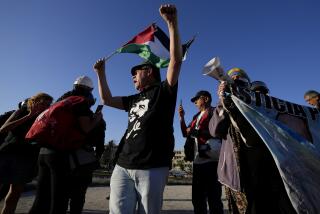Egypt voters appear to approve new constitution
CAIRO — President Mohamed Morsi apparently secured a victory at the polls Saturday for a new Egyptian constitution, locking the country into a bitter contest between his ascendant Islamist camp and his secular opponents.
Morsi managed to push the controversial document through after a political crisis brought on by his declaration a month ago giving himself wide-ranging emergency powers.
Although Morsi rolled back much of that decree — amid massive protests and street clashes — he insisted on bringing the new constitution to a referendum. The president called the move necessary for stability, and he warned that there was a plot to sabotage Egypt’s new democracy by loyalists to former President Hosni Mubarak’s authoritarian regime, overthrown nearly two years ago.
Morsi’s steamrolling of his secular opponents and reliance on the vast grass-roots network of his former party, the Muslim Brotherhood, to get out the vote has galvanized non-Islamists.
Opponents, including Nobel laureate winner Mohamed ElBaradei and former Arab League Secretary-General Amr Moussa, have made common cause against Morsi under a coalition named the National Salvation Front.
The secular leaders and their parties, which had largely been in disarray since the fall of Mubarak, say recent protests have breathed new life into the oft-divided opposition. They are convinced that Morsi has been weakened in the confrontations and are now predicting a strong showing in elections for parliament seats, scheduled for two months after passage of the constitution.
Morsi’s vice president, Mahmoud Mekki, resigned Saturday. Egypt’s new constitution does not call for a vice president.
In his statement, Mekki, a former judge, said he had planned to leave office last month, but events forced him to stay on. His words had a caustic edge: “I realized a while ago that the nature of politics does not suit my professional nature as a judge,” he said.
There also was a television report announcing the resignation of Central Bank Gov. Farouk Okadah, but that was swiftly denied by the official state news agency.
The constitution has sown fear among secular Egyptians that its language will allow Islamists to slowly transform the country into a theocratic state that oppresses women and minorities and denies basic freedoms. Critics, who boycotted the constitution-writing process, complain that the Islamists foisted the document on the public rather than addressing popular concerns.
“What happened is that this constitution was born without the inclusion of all of the Egyptian people who should have written it. Those who wrote it are ... Salafist, Islamist and Brotherhood figures,” said Nabil Abdelfattah, a legal expert at Al Ahram Center for Political and Strategic Studies. “This is why people are rejecting it. This constitution will not last for a long time because it only represents the needs of Islamist factions.”
Recent weeks have proved costly for all. Clashes between Morsi’s supporters and detractors have claimed the lives of at least 10 people and raised the possibility that Egypt’s political disputes will remain violent for some time.
The first round of the referendum vote last week covered 10 of Egypt’s 27 governorates, including urban hubs such as Cairo. Only 32% of voters showed up, and just 56% of those approved the document, according to the preliminary results.
Opposition figures, including ElBaradei, took the results as proof that the Islamists’ popularity was fading. On Saturday night, however, the Muslim Brotherhood was claiming on its Twitter account that 71% of people voted “yes” in the second round of voting, which covered rural areas that have been traditional Islamist strongholds. There was no way to confirm the numbers.
Brotherhood members argue that the constitution will provide space for their left-wing and liberal opponents to have a voice.
“This will actually allow the opposition to organize and run in elections and become an actual opposition force that can have political power and representation in parliament,” Muslim Brotherhood member Mohamed Abdel Quddous said.
Some voters on Saturday said they saw voting “yes” as simply as matter of asking for a return of law and order after protracted uncertainty.
“We were put in a situation where we have no choice. We need a constitution in place in order to have safety and stability,” said voter Osama Ahmed Mohamed, a 27-year-old Web designer from Port Said.
Members of the opposition on Saturday were already citing alleged violations at the polls, claiming that monitors were blocked from entering voting stations. Similar complaints were made the previous Saturday, with witnesses saying voters were turned away at stations or the vote was delayed in areas where the constitution was not expected to do well. The controversy caused a rift among judges who were supposed to oversee the vote, with many refusing to take part.
On Friday, tension boiled over in the port city of Alexandria, where a rally by Islamists for the constitution devolved into violent clashes with opposition supporters that left at least 63 people hurt.
Special correspondent Abdellatif reported from Cairo and Times staff writer Parker from Beirut.
More to Read
Sign up for Essential California
The most important California stories and recommendations in your inbox every morning.
You may occasionally receive promotional content from the Los Angeles Times.










